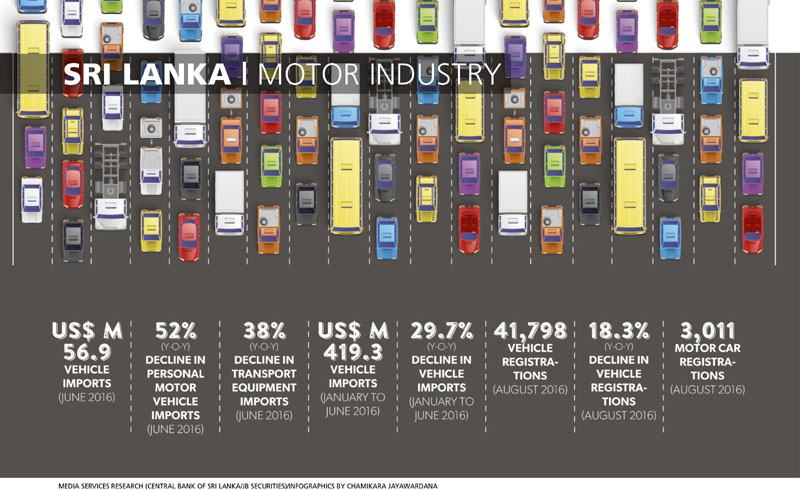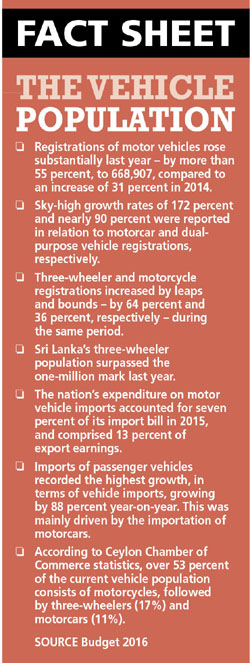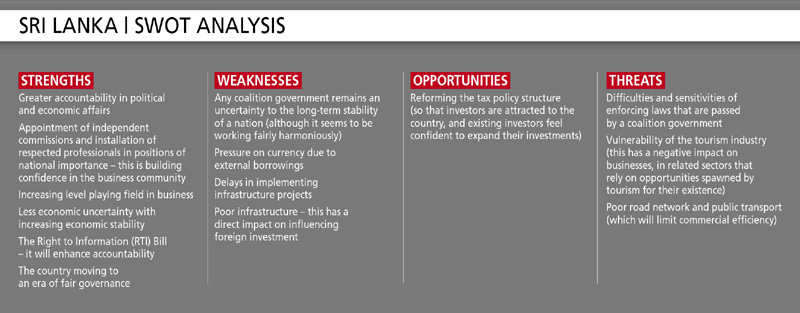CHANGING GEARS
Compiled by Yamini Sequeira
CASH COW MINDSET MUST END!
Mahen Thambiah urges the authorities to put a stop to periodic tax revisions

The change in the method of valuation of imported cars, from value to unit-based measurement, has resulted in a sharp increase in vehicle prices. The Government’s attempt to derive higher revenue from the import of cars – by way of higher duties and taxes – has led to vehicle prices increasing steeply, in recent months.
And the direct result of this policy decision has been a slowdown in vehicle imports, not to mention a generally lacklustre motor industry.
Mahen Thambiah remarks: “Although the Government is justified in looking for higher sources of revenue, and though the unit rate system introduced is good for regulating tax anomalies, the basis and rates are questionable. They could be counterproductive.”
“Prices have increased substantially at the lower end, and astronomically in the middle sector. This is unfortunate, because the result is that prospective vehicle owners who were looking to upgrade from a cheap vehicle or migrate from a two-wheeler to a car have changed their minds, as they cannot afford the steep cost revision,” he adds.
At the end of the day, Thambiah notes, “we have seen a decline in sales at the lower to mid segments of the industry. On the other hand, luxury car prices have remained fairly stable.”
SHORT-SIGHTED VISION The motor industry has been treated as a convenient cash cow by successive governments. They’ve seen no harm in compromising the industry in the short term, as it always bounces back, when tax and duty reliefs are extended once again.
However, while vehicle registrations might return to normal levels, the industry remains volatile as a result of its vulnerability to tax changes. “In most cases, this reduces the extent of investment in the industry,” notes Thambiah, who observes that the need of the hour “is to regularise the tax regime and regulate tax anomalies.”
And he laments: “This atmosphere of uncertainty affects the profitability of the motor industry, and deters greater investment by foreign joint venture partners.”

VEHICLE REGISTRATIONS The increase in motor vehicle registrations last year was driven by rising disposable incomes, low interest rates for vehicle leasing, and relatively low taxes on hybrid and electrical vehicles, and on motorcars with an engine capacity of less than 1000cc.
But with the upward tax revision on motor vehicle imports, the discontinuation of concessionary tax permits for public servants (as proposed in Budget 2016), restrictions imposed by the Central Bank of Sri Lanka on financing vehicle purchases, depreciation of the rupee and a gradual increase in interest rates, vehicle registrations have continued to decline sharply since January.
CURBING POLLUTION “It is plain to see that there’s a need to raise the eco-friendly profile of the industry, by controlling emission levels.
Sri Lanka is at the Euro II fuel adoption standard, while the US and EU have moved to the Euro VI standard, which explains our high traffic pollution levels,” Thambiah says, in regard to sustainability of the motor industry.
The Government is encouraging the import of hybrid and electric cars, with lower tariffs. He asks: “But what is the purpose of having lower duty and earning less revenue, if used vehicles are allowed to be imported into Sri Lanka and pollution levels cannot be curbed?”
Moreover, hybrid and electric vehicles cost twice as much, and much-needed foreign exchange is expended on importing hybrid vehicles. Thambiah points out that legislation pertaining to used vehicles needs to be reviewed continuously, for the maximum number of years of use abroad.
Used commercial vehicles such as buses and trucks are the main culprits, when it comes to high emission levels, as they’re used for up to four years abroad, before being imported to Sri Lanka.

TRAFFIC MANAGEMENT There are numerous challenges facing the industry, and traffic congestion in major cities and towns – not to mention road safety – is an urgent issue that must be addressed.
The country’s inadequate public transportation system results in traffic volumes exceeding the capacity of our roads. The outcome is congestion, which is compounded by the misuse of road space, unauthorised roadside parking and rash driving.
Indeed, the traffic police has introduced various measures to combat these challenges: one-way roads; the rearrangement of the timing of traffic light systems; and the expansion of signal systems, signs, road markings, and bus and parking bays are among the new initiatives.
Meanwhile, the Colombo Municipal Council (CMC) is expected to install solar-powered parking meters in selected locations around the city. A technical assistance project for the establishment of an Advanced Traffic Management System (ATMS) in the Colombo Metropolitan Region, under Korea International Cooperation Agency (KOICA) assistance, is in progress. Under this project, a Centralised Traffic Control System, with advanced traffic management features, is expected to be developed.
PAVING THE PATH Thambiah remarks that “there has been a noticeable hike in vehicle registrations since the end of the war. But the question is whether the increase of vehicles on the road is proportionate to the rehabilitation and enhancement of the country’s road and highway network. Unless we build better public infrastructure and improve the road network, problems such as traffic congestion will persist.”
Among the proposals tabled thus far is an elevated highway network in Colombo, to reduce traffic congestion and improve road connectivity between suburbs and expressways. The national highways cater to over 80 percent of traffic in Sri Lanka.
Another major problem is the incidence of road accidents – one of the primary causes of fatalities in Sri Lanka. There were 2,590 fatal road accidents reported last year.
Records indicate that 23 percent of the drivers who were responsible for fatal accidents did not possess valid licences, with the worst offenders being motorcycle riders, and lorry and van drivers.

Thambiah opines: “In my view, the negative points system, which eventually results in revoking driving licences, will work well to deter rash and irresponsible driving. Efforts by the traffic police to deter drunk driving are already visible, with considerable implementation of this rule. Similarly, all laws must be enforced for greater compliance by motorists.”
Looking ahead with optimism, Thambiah is hopeful that existing policy uncertainty in the industry will be dispelled by the regulator, sooner rather than later.



